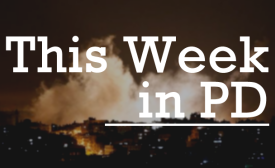gaza
We no longer have to rely solely on reports from a handful of mainstream media outlets when news breaks in places like Ukraine or Gaza, and while that has made the news environment more chaotic it has also led to some significant benefits for journalism.
Turkey on Monday declared three days of national mourning for the Palestinian victims of Israel's military operation in the Gaza Strip, denouncing the assault as a "massacre." "We condemn Israel's massacre of the Palestinian people," Deputy Prime Minister Bulent Arinc told reporters in Ankara in televised comments after a cabinet meeting as the Palestinian death toll topped 500.
The $1-billion program, subsidized by the United States, has served Israel well in Operation Protective Edge, its recent campaign against Hamas in Gaza. Palestinian militants have lobbed almost 1,000 missiles into Israel, but Iron Dome's interceptors have struck down 87% of their targets, according to the Israelis, allowing life in Israel’s cities to proceed more or less normally. How does it work?

As tensions between Israel and Hamas continue to escalate in the Gaza Strip, another battle is raging on social media for the support of American and global audiences.
Israel's Ambassador to the US Ron Dermer(link is external) landed himself in hot water Thursday when his Twitter Q&A #AskDermer(link is external) was hijacked by Palestine activists. The Q&A was held amid escalating violence between Israel and Hamas forces in Gaza.
As The Jerusalem Post reports, the effort to make Israel’s case is being spearheaded by 400 college students posting comments, memes, video clips, images and explanatory graphics on Facebook and Twitter from dozens of computers in a “Hasbara war room” at the Interdisciplinary Center in Herzliya, north of Tel Aviv.
For most citizens of Israel, Operation Protective Edge is being fought on two fronts. But as we learned from previous operations, the conflict has a third front, an international front, where public opinion is formed.
Someone once told me that in Gaza “things are never so bad that they can’t get worse.” Those words came back when I read that the Israeli prime minister has told his military “to take the gloves off” to stop the rocket fire from Gaza.







